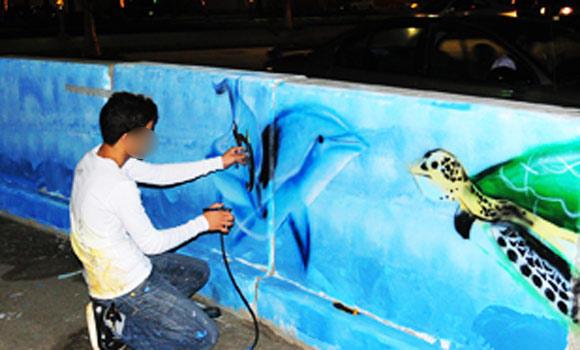
Jeddah, Mar 27: The Jeddah Municipality is considering a decision to impose fines of anywhere between SR500 and SR1,000 on people who spray-paint profanities and indecent drawings on the city’s walls in both popular and remote neighborhoods, Abdulaziz Al-Ghamdi, municipality spokesman said.
Municipality maintenance teams have embarked on repainting several walls and public utilities in neighborhoods, including Bagdadia, Sabeel, Saheefah and Karantina.
“About 50 percent of these areas are in need of repainting,” he said. He appealed to youth to stop this illegal practice and encouraged them to put their creativity to better use.
“There are specialized clubs and art centers in the city for youth to hone their skills,” he said. “The drawings and slogans on these walls are often offensive and culturally unacceptable.”
Several fine arts, sociology and psychology professors told Arab News that the youth resort to this type of practice because they have too much free time and energy.
“Writing on walls and public utilities indicates an emotional void,” said Jaber Al-Mutlak, a social worker at the Ministry of Social Affairs in Makkah. “Such acts are an expression of resentment, disappointment and failure, either on the personal front or the social front.”
This type of energy, however, can be put to good use through the Education Ministry, he said. Competitions with awards and prizes, for instance, would attract many young talents. There are youth hostels under the General Presidency for Youth Welfare that offer artistic outlets across the country.
“Teens and adults in their twenties most often practice these types of hobbies,” said Abdul Mannan Malabar, a psychology professor and guidance counselor at King Abdulaziz University in Jeddah. “They intentionally and deliberately compromise the outer appearance of public utilities. Some of these youngsters suffer severe psychological, behavioral and social disorders and find difficulty expressing themselves.”
Parents and educational institutions must pay much more attention to this age bracket in order to transform this negative phenomenon into conducive creativity, he suggested.
“Wall-graffitiing is a practice that originated in the USA among the working class,” said Saudi artist Zuhair Toulah. “Yet today, the attitudes and conceptions surrounding this kind of art vary from country to country.”





Comments
Add new comment